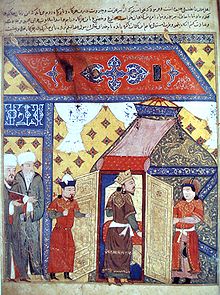Gazan Khan
| Ghazan the Great | |||||
|---|---|---|---|---|---|
| Khan pādishāh-i Īrān wa Islām (in Persian) |
|||||

|
|||||
| Reign | 1295– 11 May 1304 | ||||
| Predecessor | Baydu | ||||
| Successor | Öljeitü | ||||
| Born | 5 November 1271 | ||||
| Died | 11 May 1304 (aged 32) | ||||
| Consort | Kököchin | ||||
|
|||||
| Father | Arghun | ||||
| Mother | Quthluq Khatun | ||||
| Religion | Sunni Islam, previously Buddhism | ||||
| Full name | |
|---|---|
| Mahmud Ghazan |
Mahmud Ghazan (1271– 11 May 1304) (Mongolian: Газан хаан, sometimes referred to as Casanus by Westerners) was the seventh ruler of the Mongol Empire's Ilkhanate division in modern-day Iran from 1295 to 1304. He was the son of Arghun and Quthluq Khatun, continuing a long line of rulers who were direct descendants of Genghis Khan. Considered the most prominent of the Ilkhans, he is best known for making a political conversion to Islam in 1295 when he took the throne, marking a turning point for the dominant religion of Mongols in West Asia (Iran, Iraq, Anatolia and Trans-Caucassia). His principal wife was Kököchin, a Mongol princess (originally betrothed to Ghazan's father Arghun before his death) sent by his Khagan Kublai Khan, and escorted from the Mongol capital to the Ilkhanate by Marco Polo.
Military conflicts during Ghazan's reign included war with the Egyptian Mamluks for control of Syria, and battles with the Turko-Mongol Chagatai Khanate. Ghazan also pursued diplomatic contacts with Europe, continuing his predecessors' unsuccessful attempts at forming a Franco-Mongol alliance. A man of high culture, Ghazan spoke multiple languages, had many hobbies, and reformed many elements of the Ilkhanate, especially in the matter of standardizing currency and fiscal policy.
At the time of Ghazan's birth, the leader of the Ilkhanate was Abaqa Khan, his grandfather. Ghazan's father Arghun was viceroy (crown prince) in Khorasan for Abaqa. Ghazan was the eldest son of Arghun, and Qutlugh of the Dorben clan, though he was raised in the Ordo (nomadic palace-tent) of his grandfather Abaqa's favorite wife, Buluqhan Khatun, who herself was childless.
...
Wikipedia
